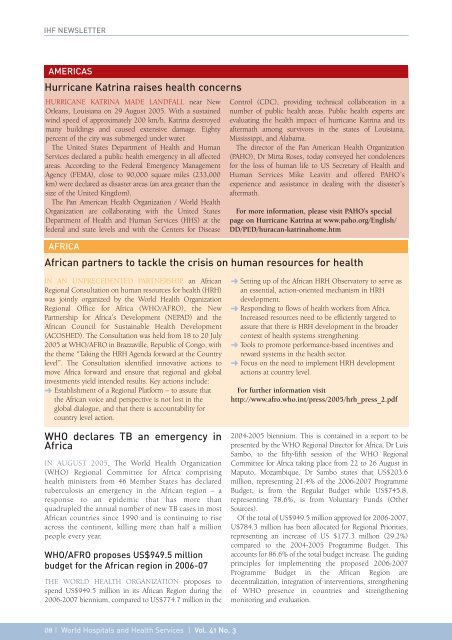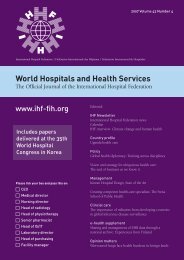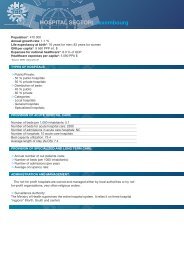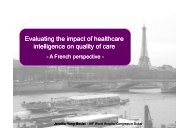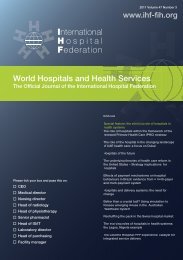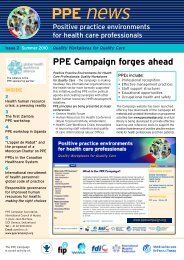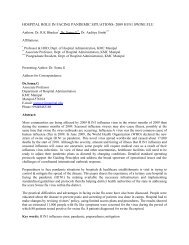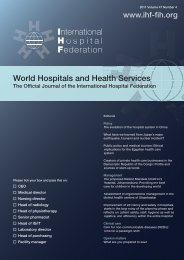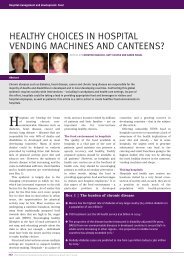World Hospitals and Health Services - International Hospital ...
World Hospitals and Health Services - International Hospital ...
World Hospitals and Health Services - International Hospital ...
You also want an ePaper? Increase the reach of your titles
YUMPU automatically turns print PDFs into web optimized ePapers that Google loves.
IHF NEWSLETTER<br />
AMERICAS<br />
Hurricane Katrina raises health concerns<br />
HURRICANE KATRINA MADE LANDFALL near New<br />
Orleans, Louisiana on 29 August 2005. With a sustained<br />
wind speed of approximately 200 km/h, Katrina destroyed<br />
many buildings <strong>and</strong> caused extensive damage. Eighty<br />
percent of the city was submerged under water.<br />
The United States Department of <strong>Health</strong> <strong>and</strong> Human<br />
<strong>Services</strong> declared a public health emergency in all affected<br />
areas. According to the Federal Emergency Management<br />
Agency (FEMA), close to 90,000 square miles (233,000<br />
km) were declared as disaster areas (an area greater than the<br />
size of the United Kingdom).<br />
The Pan American <strong>Health</strong> Organization / <strong>World</strong> <strong>Health</strong><br />
Organization are collaborating with the United States<br />
Department of <strong>Health</strong> <strong>and</strong> Human <strong>Services</strong> (HHS) at the<br />
federal <strong>and</strong> state levels <strong>and</strong> with the Centers for Disease<br />
Control (CDC), providing technical collaboration in a<br />
number of public health areas. Public health experts are<br />
evaluating the health impact of hurricane Katrina <strong>and</strong> its<br />
aftermath among survivors in the states of Louisiana,<br />
Mississippi, <strong>and</strong> Alabama.<br />
The director of the Pan American <strong>Health</strong> Organization<br />
(PAHO), Dr Mirta Roses, today conveyed her condolences<br />
for the loss of human life to US Secretary of <strong>Health</strong> <strong>and</strong><br />
Human <strong>Services</strong> Mike Leavitt <strong>and</strong> offered PAHO’s<br />
experience <strong>and</strong> assistance in dealing with the disaster’s<br />
aftermath.<br />
For more information, please visit PAHO's special<br />
page on Hurricane Katrina at www.paho.org/English/<br />
DD/PED/huracan-katrinahome.htm<br />
AFRICA<br />
African partners to tackle the crisis on human resources for health<br />
IN AN UNPRECEDENTED PARTNERSHIP, an African<br />
Regional Consultation on human resources for health (HRH)<br />
was jointly organized by the <strong>World</strong> <strong>Health</strong> Organization<br />
Regional Office for Africa (WHO/AFRO), the New<br />
Partnership for Africa’s Development (NEPAD) <strong>and</strong> the<br />
African Council for Sustainable <strong>Health</strong> Development<br />
(ACOSHED). The Consultation was held from 18 to 20 July<br />
2005 at WHO/AFRO in Brazzaville, Republic of Congo, with<br />
the theme “Taking the HRH Agenda forward at the Country<br />
level”. The Consultation identified innovative actions to<br />
move Africa forward <strong>and</strong> ensure that regional <strong>and</strong> global<br />
investments yield intended results. Key actions include:<br />
➜ Establishment of a Regional Platform – to assure that<br />
the African voice <strong>and</strong> perspective is not lost in the<br />
global dialogue, <strong>and</strong> that there is accountability for<br />
country level action.<br />
WHO declares TB an emergency in<br />
Africa<br />
IN AUGUST 2005, The <strong>World</strong> <strong>Health</strong> Organization<br />
(WHO) Regional Committee for Africa comprising<br />
health ministers from 46 Member States has declared<br />
tuberculosis an emergency in the African region – a<br />
response to an epidemic that has more than<br />
quadrupled the annual number of new TB cases in most<br />
African countries since 1990 <strong>and</strong> is continuing to rise<br />
across the continent, killing more than half a million<br />
people every year.<br />
WHO/AFRO proposes US$949.5 million<br />
budget for the African region in 2006-07<br />
THE WORLD HEALTH ORGANIZATION proposes to<br />
spend US$949.5 million in its African Region during the<br />
2006-2007 biennium, compared to US$774.7 million in the<br />
➜ Setting up of the African HRH Observatory to serve as<br />
an essential, action-oriented mechanism in HRH<br />
development.<br />
➜ Responding to flows of health workers from Africa.<br />
Increased resources need to be efficiently targeted to<br />
assure that there is HRH development in the broader<br />
context of health systems strengthening.<br />
➜ Tools to promote performance-based incentives <strong>and</strong><br />
reward systems in the health sector.<br />
➜ Focus on the need to implement HRH development<br />
actions at country level.<br />
For further information visit<br />
http://www.afro.who.int/press/2005/hrh_press_2.pdf<br />
2004-2005 biennium. This is contained in a report to be<br />
presented by the WHO Regional Director for Africa, Dr Luis<br />
Sambo, to the fifty-fifth session of the WHO Regional<br />
Committee for Africa taking place from 22 to 26 August in<br />
Maputo, Mozambique. Dr Sambo states that US$203.6<br />
million, representing 21.4% of the 2006-2007 Programme<br />
Budget, is from the Regular Budget while US$745.8,<br />
representing 78.6%, is from Voluntary Funds (Other<br />
Sources).<br />
Of the total of US$949.5 million approved for 2006-2007,<br />
U$784.3 million has been allocated for Regional Priorities,<br />
representing an increase of US $177.3 million (29.2%)<br />
compared to the 2004-2005 Programme Budget. This<br />
accounts for 86.6% of the total budget increase. The guiding<br />
principles for implementing the proposed 2006-2007<br />
Programme Budget in the African Region are<br />
decentralization, integration of interventions, strengthening<br />
of WHO presence in countries <strong>and</strong> strengthening<br />
monitoring <strong>and</strong> evaluation.<br />
08 | 12 <strong>World</strong> | WORLD <strong><strong>Hospital</strong>s</strong> hospitals <strong>and</strong> <strong>Health</strong> <strong>and</strong> health <strong>Services</strong> services | Vol. 41 No. 3


